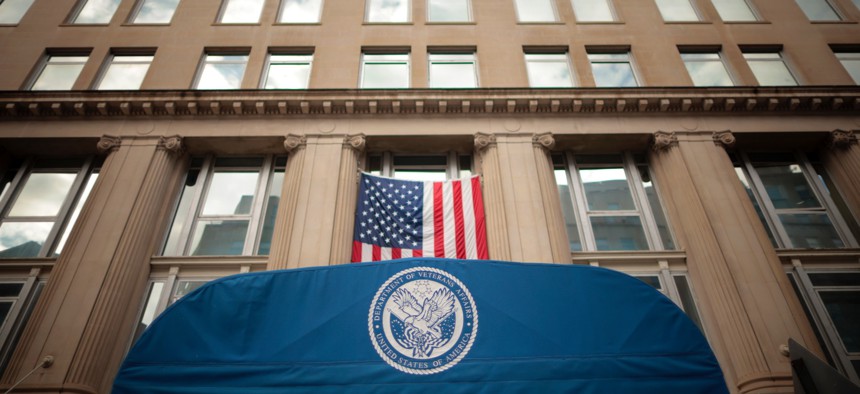
Senior Executive Service and General Schedule-14 and 15 employees serving in those roles at the VA have signed NDAs, according to five employees briefed on the situation. Chip Somodevilla / Getty Images
VA forces staff in workforce reduction discussions to sign non-disclosure agreements
Senior leaders are contemplating which jobs to keep and which to slash in meetings, but telling staff they cannot discuss those topics.
The Veterans Affairs Department is requiring all employees working on its plans to slash tens of thousands of workers from its rolls to sign non-disclosure agreements, an unusual move that has prevented supervisors from sharing basic information with staff.
VA has begun holding meetings with representatives from across the department to discuss its workforce reduction plans after standing up a Reorganization Implementation Cell. Senior Executive Service and General Schedule-14 and 15 employees serving in those roles have signed NDAs, according to five employees briefed on the situation. Government Executive first reported that VA plans to cut its workforce down to fiscal 2019 levels, leading to cuts of around 80,000 employees.
Senior leaders throughout VA appear to be taking their NDAs seriously. In a recent meeting, a recording of which was obtained by Government Executive, Colleen Richardson, executive director of VA's Caregiver Support Program, told employees she had answers to their questions but could not disclose them.
Richardson said, for example, she could not disclose how many employees had signed up for the department’s “deferred resignation program” that has enabled some staff to remain on paid leave until they separate from the agency by Sept. 30. Employees were eager to know the information as more people signing up will result in fewer employees being laid off.
“I want to just let people know a majority of senior leaders have been asked to sign non-disclosure agreements, NDAs," Richardson said. “I have been asked to sign an NDA so we are very, very limited on what information we can also share.”
NDAs for issues such as personnel matters are highly unusual in government, where such agreements are typically limited to procurement-sensitive discussions and national security settings that include classified information. One senior human resources official in another part of government called the agreements “strange, technically unnecessary and redundant.”
Federal employees already agree to not disclose deliberative matters to the public as part of their jobs and therefore the substance of the NDA is already implied and expected, that person said. The official speculated VA was seeking to limit what employees can say about those discussions in the event that they are themselves part of a reduction in force, as the NDA would likely extend beyond their termination.
VA did not respond to a request for comment.
Rep. Mark Takano, D-Calif., the top Democrat on the House Veterans Affairs Committee, said the NDAs could illegally circumvent whistleblower protection laws and encouraged employees to come forward to help lawmakers shed a light on the process.
“The use of NDAs in this context looks like a deliberate effort by the Trump administration to silence VA employees and block oversight," Takano said. "Secretary [Doug] Collins has failed to answer basic questions from Congress, and now his department is doubling down on secrecy."
Members of both parties have expressed apprehension about VA's large-scale workforce reduction plans.
One VA employee who has discussed the NDA-subjected meetings with attendees said the senior leaders “don’t like” having to sign the agreements but “are being cautious not to create chaos.”
“These are all really good, talented and caring leadership being thrown in the middle of this scuffle and are doing their best to protect us and our programs,” the employee said. “I feel for them and know they are bruised and tired.”
Another VA employee said a senior executive told 200 staff in a town hall that they were restricted by the NDA. The leadership team of that office has “been as open with us” as they can, but have offered up few details of the workforce reduction discussions. A third VA staffer briefed on the meetings found some comfort in, unlike some other agencies, the department involving career staff in the workforce meetings.
VA will review the suggestions from individual components in May and release its reorganization plan in June. RIFs will take place by September.
The discussions to date have focused on which positions VA will shed, according to one official familiar with them, though they have not yet begun contemplating which actual individuals will lose their jobs. The meetings have also involved the impacts of the hiring freeze and requests for additional exemptions. The leadership teams are reacting constantly to updates from the top levels of the department as “the rules of the game seem to be changing by the day,” the official said.
Another VA employee said the meetings have also honed in on reductions to the department’s call centers. VA currently has many call centers, including one at each of its regional offices for scheduling appointments. The most recent plan, the employee said, is to cut that down to two call centers: one for scheduling appointments and another for matters such as billing, pharmacy and community care. VA’s 988 crisis line would also remain separate.
Richardson, the Caregiver Support Program executive, told employees she had to withhold details from them.
“There are certain things I cannot discuss even if I know them,” she said. “My sincere apologies, but that’s the truth behind it.”
How are these changes affecting you? Share your experience with us:
Eric Katz: ekatz@govexec.com, Signal: erickatz.28
NEXT STORY: Interior solicits employees' resumes in preparation for widespread layoffs







